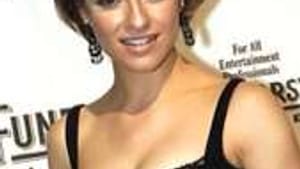Stay in the Loop
BSR publishes on a weekly schedule, with an email newsletter every Wednesday and Thursday morning. There’s no paywall, and subscribing is always free.
A different kind of wickedness
"Wicked' returns to the Academy

Wicked, the musical back-story of what happened before Dorothy arrived in Oz, is about to observe its ten-year anniversary as a Broadway hit. It's still playing to 93 percent of capacity at Broadway's largest theater, the Gershwin, while bringing in over $2 million each week and also successfully touring the world. In an era dominated by small-scale musicals, Wicked remains a big and busy production, with lavish sets, costumes and choreography.
The show is back in Philly for a five-week engagement at the Academy of Music, and my perceptions have changed since I reviewed Wicked for BSR in 2007. (For that review, click here.)
As the good witch Glinda and the Wizard of Oz, respectively, Jenn Gambatese and John Davidson aren't necessarily better or worse than the originators Kristin Chenoweth and Joel Grey. But their conceptions (directed by Joe Mantello) change the arc of the drama.
Brazenly cute
Chenoweth sang and acted Glinda with adorable charm, winking at the audience as she won everyone's heart onstage and off. Most of the other Glindas I've seen in the past decade seemed to replicate Chenoweth's perky effervescence. Only Gambatese took a different approach, employing brazenly cute gestures to court the affection of Glinda's schoolmates and, later, her political constituents.
This ploy tipped the story more favorably towards the character of the green-skinned Elphaba (played quite well by Laurel Harris). When Wicked opened in 2003 it was considered radical to present the wicked witch as a heroine. Now it's a given, and it doesn't need underlining. An ambiguous and shifting balance between the two women would be ideal.
Gambatese, by the way, sings the role with the best soprano voice of any Glinda I've seen. Although Chenoweth was accepted as an opera student at the Academy of Vocal Arts, Gambatese's voice delivers more soaring high notes. She'd make an ideal star of Phantom of the Opera, although most of her previous roles (Footloose, Hairspray, Disney's Tarzan) have been more pop-oriented.
Accepting differences
Joel Grey as Wicked's original Wizard of Oz was loveable, diminutive and wispy of voice— and consequently all the more alarming when we realized he was an evil dictator. John Davidson, by contrast, is tall and handsome, with a strong singing voice. Yet I missed the inherent dramatic contrast in a cuddly figure who turns out to be the opposite.
Elphaba, in author Gregory Maguire's conception, is shunned by her authoritarian father and regarded suspiciously by everyone else. One of the show's recurring themes, in fact, is the notion of accepting people who look different. This premise has attracted throngs of adolescent girls to the show, and I'm surprised it hasn't drawn in crowds of racial minorities as well.
The show is back in Philly for a five-week engagement at the Academy of Music, and my perceptions have changed since I reviewed Wicked for BSR in 2007. (For that review, click here.)
As the good witch Glinda and the Wizard of Oz, respectively, Jenn Gambatese and John Davidson aren't necessarily better or worse than the originators Kristin Chenoweth and Joel Grey. But their conceptions (directed by Joe Mantello) change the arc of the drama.
Brazenly cute
Chenoweth sang and acted Glinda with adorable charm, winking at the audience as she won everyone's heart onstage and off. Most of the other Glindas I've seen in the past decade seemed to replicate Chenoweth's perky effervescence. Only Gambatese took a different approach, employing brazenly cute gestures to court the affection of Glinda's schoolmates and, later, her political constituents.
This ploy tipped the story more favorably towards the character of the green-skinned Elphaba (played quite well by Laurel Harris). When Wicked opened in 2003 it was considered radical to present the wicked witch as a heroine. Now it's a given, and it doesn't need underlining. An ambiguous and shifting balance between the two women would be ideal.
Gambatese, by the way, sings the role with the best soprano voice of any Glinda I've seen. Although Chenoweth was accepted as an opera student at the Academy of Vocal Arts, Gambatese's voice delivers more soaring high notes. She'd make an ideal star of Phantom of the Opera, although most of her previous roles (Footloose, Hairspray, Disney's Tarzan) have been more pop-oriented.
Accepting differences
Joel Grey as Wicked's original Wizard of Oz was loveable, diminutive and wispy of voice— and consequently all the more alarming when we realized he was an evil dictator. John Davidson, by contrast, is tall and handsome, with a strong singing voice. Yet I missed the inherent dramatic contrast in a cuddly figure who turns out to be the opposite.
Elphaba, in author Gregory Maguire's conception, is shunned by her authoritarian father and regarded suspiciously by everyone else. One of the show's recurring themes, in fact, is the notion of accepting people who look different. This premise has attracted throngs of adolescent girls to the show, and I'm surprised it hasn't drawn in crowds of racial minorities as well.
Sign up for our newsletter
All of the week's new articles, all in one place. Sign up for the free weekly BSR newsletters, and don't miss a conversation.

 Steve Cohen
Steve Cohen